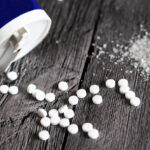Ultimate irony: New study shows artificial sweeteners cause weight gain
 (NaturalHealth365) From the start, it seemed a little too good to be true. In the early 1980s, artificial sweeteners were suddenly everywhere – imparting their miraculous sweetness to “sugar-free” and “diet” beverages while not adding a single calorie. In addition, artificial sweeteners didn’t appear to contribute to tooth decay or diabetes – two adverse effects of the refined sugar they were meant to replace.
(NaturalHealth365) From the start, it seemed a little too good to be true. In the early 1980s, artificial sweeteners were suddenly everywhere – imparting their miraculous sweetness to “sugar-free” and “diet” beverages while not adding a single calorie. In addition, artificial sweeteners didn’t appear to contribute to tooth decay or diabetes – two adverse effects of the refined sugar they were meant to replace.
Jump forward four decades to the present day, in which a shocking 43 percent of Americans are obese (a figure that has almost tripled since the 1980s), and over 37 million have diabetes. (In other words, obesity and type 2 diabetes have reached epidemic status!) To top it off, researchers at the University of Minnesota Medical School have just published a study examining the effects of artificial sweeteners on body weight and heart disease risk. You won’t want to miss their eye-opening conclusion.
First-of-its-kind observational study shines light on artificial sweetener harms
The 20-year study, which was published in the International Journal of Obesity, focused on the relationship between dietary intake and heart disease risk factors, with particular emphasis on the effects of non-nutritive sweeteners such as aspartame (marketed as Equal and NutraSweet), saccharine (Sweet and Low) and sucralose (Splenda).
The team used questionnaires and computed tomography to evaluate 3,088 adults aged 18 to 35 in the Coronary Artery Risk Development in Young Adults study (conveniently abbreviated to CARDIA). The scientists were careful to account for other factors as well, including age, sex, race, education, lifestyle habits, exercise levels, and quantity and quality of diet.
What did they conclude?
Long-term use of artificial sweeteners like aspartame increases storage of fat
In simple terms, the study showed that long-term use of artificial sweeteners was associated with greater body mass, body weight, and waist circumference. Study co-leader Brian Steffen, Ph.D., MSCR, a professor in the Department of Surgery at the U of M Medical School, stated the findings unequivocally: “Habitual, long-term intake of … artificial sweeteners (is) related to greater volumes of adipose tissue …” In case you’re wondering what adipose tissue is, Dr Steffen elaborates. “(It’s) commonly known as body fat.” In fact, artificial sweeteners caused increases in three different types of adipose tissue – visceral fat, intermuscular fat, and subcutaneous fat. The scientists speculated that artificial sweeteners may cause weight gain by increasing appetite and suppressing enzymes that help to control weight.
Discover a Simple and Effective Way to Remove Toxins: This is Jonathan's #1 choice for at-home detoxification. Special offer ends Feb. 16.
Hoping to stem the tide of the national epidemic of obesity and type 2 diabetes, the American Diabetes Association had formerly called for replacing added sugars with artificial sweeteners. In light of the new research, the ADA is now reconsidering this advice and calling for “safer alternatives.”
Interestingly, the artificial sweetener known as sucralose is off the hook – in this study, at least. Researchers found no evidence that it caused increased fat storage.
Warning: The World Health Organization labels aspartame a possible carcinogen
The U.S. Food and Drug Administration (FDA), which approved aspartame for use in food and drink in 1981, insists that the sweetener is safe for most people. However, multiple studies have raised concerns. A 2017 review published in the Canadian Medical Association Journal warned that regular consumption of artificial sweeteners could increase the risk of heart disease, diabetes, and stroke. Other studies have shown that high levels of artificial sweeteners can disrupt intestinal bacterial balance, trigger glucose intolerance, and increase the risk of metabolic syndrome in obese people.
In addition, the sugar alcohols used in some artificial sweeteners can cause digestive problems – such as bloating, cramps, and diarrhea – for some people. (Seriously, who needs that?) As if that weren’t reason enough to bypass aspartame, on July 13th, the World Health Organization (WHO) classified the compound as a Group 28 carcinogen or a “possible” cause of cancer. Finally, aspartame has been linked to mood disorders, depression, and autism.
(Isn’t aspartame beginning to seem like something you wouldn’t give to your worst enemy?!)
Buyer beware: Artificial sweeteners can lurk in common products
Artificial sweeteners are found in many foods advertised as “sugar-free,” “zero sugar,” “reduced sugar,” and “diet.” These include gum, jellies, jams, syrup, and gelatin desserts. Check the ingredient label before buying.
Avoiding highly processed foods while eating healthy amounts of high-fiber, antioxidant-rich organic fruits, vegetables, nuts, and legumes can help set the stage for a weight loss journey. Judicious amounts of wild-caught fatty fish, grass-fed beef, pasture raised eggs, and raw dairy can provide high-quality protein, while probiotic and prebiotic foods – such as bananas, kimchee, fresh sauerkraut and miso – support gut and metabolic health, making it easier to avoid weight gain. Of course, getting sufficient exercise through walking, running, dancing, biking, or lifting weights is an important part of the puzzle.
Clearly, herbal teas, sparkling water, or your favorite homemade smoothie are far more refreshing choices than chemical-laden, artificially colored “diet” beverages sweetened with aspartame or saccharine. If you absolutely must add a bit of sweetness, a drizzle of raw honey, maple syrup, molasses, agave nectar, or stevia is probably your best bet.
As the latest study clearly shows, artificial sweeteners represent a hollow promise. The knowledge that they may be making us less healthy and more overweight makes their artificially sweet flavor increasingly bitter.
Sources for this article include:
Nature.com
ScienceDaily.com
MedicalNewsToday.com
USAFacts.org
ClevelandClinic.org
CBSNews.com



